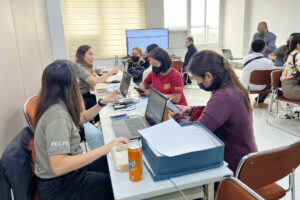A PHILIPPINE senator on Monday called for the review of bilateral labor deals and recruitment policies with Kuwait after two overseas Filipino workers (OFWs) based in the West Asian country died of “anomalous causes.”
“The government must stop the abuse in its tracks by strengthening recruitment policies and ensuring that host countries comply with bilateral agreements on the welfare and rights of OFWs,” Senator Emmanuel Joel J. Villanueva said in a statement.
“We cannot be reactive and rely on a ban-lift-ban cycle of OFW deployment.”
Kuwait-based worker Jenny Alvarado on Jan. 2 was reported to have died by coal smoke inhalation at her place of work with her Nepalese and Sri Lankan coworkers.
In December, the decomposing body of Dafnie Nacalaban, a domestic worker in Kuwait since 2019, was dug up and discovered at the residence of a Kuwaiti national. She had been reported missing by her employer since October.
Migrant Workers Secretary Hans Leo J. Cacdac earlier said his agency was temporarily halting OFW deployment to Kuwait due to the deaths.
The Philippines in 2018 imposed a worker deployment ban to the Gulf country after the killing of Filipina domestic helper Joanna Daniela Demafelis, whose body was found in a freezer at an abandoned apartment. It partially lifted the ban in the same year after the two countries signed a protection agreement for workers.
In May 2019, Filipina maid Constancia Lago Dayag was killed in Kuwait, and a few months later, another one, Jeanelyn Villavende, was tortured by her employer to death.
The government again imposed a deployment ban in January 2020, which it lifted when Kuwaiti authorities charged Ms. Villavende’s employer with murder and sentenced her to death by hanging.
The International Labor Organization has said only 6% of domestic workers worldwide have access to comprehensive protection including medical care and unemployment benefits.
“Every OFW we allow to work in a foreign land must be assured of a safe workplace, decent living conditions, timely payment of correct wages and benefits, and must be able to return to their families alive and with gainful income worthy of their sacrifices,” Mr. Villanueva said.
DIPLOMATIC OPTIONSIn a separate statement, a lawmaker also asked the Philippine Department of Migrant Workers (DMW) to weigh all diplomatic options and “seriously study” its proposal to implement a deployment ban in Kuwait.
Mr. Cacdac last week floated the possibility of declaring a deployment ban on Kuwait following the recent deaths of two OFWs in the middle eastern country.
“We appeal to the DMW to seriously study and rethink its reported consideration of another deployment ban, and to adopt a more nuanced and strategic approach,” Party-list Rep. Ron P. Salo said in a statement.
“An outright ban may exacerbate the situation of approximately 260,000 Filipinos currently working in Kuwait, potentially placing them in even more precarious positions,” he added.
Manila prohibits first-time OFWs from being deployed to Kuwait, according to Mr. Cacdac.
“It is also essential to consider that deployment bans are typically implemented when a host country violates an existing bilateral agreement. Crimes committed by private individuals, though deeply tragic, do not necessarily constitute a breach by the Kuwaiti government,” said Mr. Salo.
“Determining the host government’s breach, if any, is vital before imposing such an extreme measure,” he added. — John Victor D. Ordoñez and Kenneth Christiane L. Basilio
